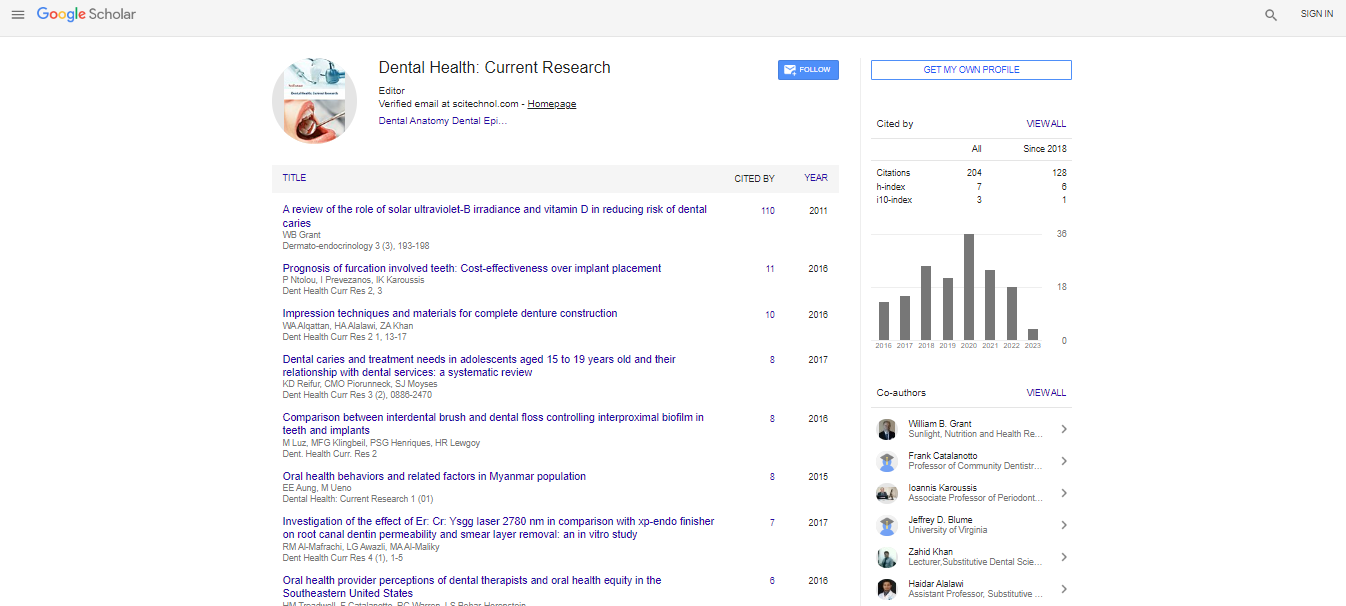Editorial, Dent Health Curr Res Vol: 7 Issue: 6
Oral and Maxillofacial Surgery
Katherine Williams*
Institute of Dental Research Center, North Umberia University, United Kingdom
- *Corresponding Author:
- Katherine Williams
Institute of Dental Research Center, North Umberia University, United Kingdom
E-mail: katherine.w@yahoo.com
Received Date: June 25, 2021; Accepted Date: June 26, 2020; Published Date: June 29, 2020
Citation: Williams K (2021) Oral and Maxillofacial Surgery. Dent Health Curr Res 7:4. e107.
Copyright: © All articles published in Dental Health: Current Research are the property of SciTechnol, and is protected by copyright laws. “Copyright © 2021, SciTechnol, All Rights Reserved.
Keywords: Maxillofacial Surgery
Introduction
Oral and maxillofacial surgery is a surgical speciality that focuses on facial reconstructive surgery, facial trauma surgery, oral cavity surgery, head and neck surgery, mouth and jaw surgery, and facial aesthetic surgery. Oral and maxillofacial surgery is a dental speciality that deals with the diagnostic, surgical, and adjuvant treatment of diseases, injuries, and deformities that affect both the functional and aesthetic elements of the oral and maxillofacial region’s hard and soft tissues.
In the United States, oral and maxillofacial surgeons with a single or dual degree can specialise further after residency by completing a one-or two-year sub-specialty oral and maxillofacial surgery fellowship in one or more of the following areas:
1. Cosmetic face surgery, such as blepharoplasty (eyelid surgery), rhinoplasty (nose surgery), facial lifts, brow lifts, and laser resurfacing
2. Trauma to the zygomatic (cheek bone), orbital (eye socket), mandibular, and nasal bones, as well as face soft tissue lacerations and penetrating neck injuries.
3. Craniofacial surgery/pediatric maxillofacial surgery, such as cleft lip and palate repair and trans-cranial craniofacial surgery, such as Fronto-Orbital Advancement and Remodelling (FOAR) and complete vault remodelling
4. Microvascular repair and head and neck cancer free flap surgery
5. Maxillofacial regeneration, which involves using modern stem cell technology to re-form the facial region.
A medical degree and intensive training in dental medicine are required for an oral and maxillofacial surgeon. While an oral surgeon is unable to execute the most modern oral surgical treatments, a maxillofacial surgeon has no restrictions on the sorts of dental surgery that can be performed.
Surgical procedures on the mouth, jaws, and face are performed by oral and maxillofacial surgeons. Dental implant surgery, bone grafting, wisdom teeth extraction, corrective jaw surgery (orthognathic surgery), maxillofacial trauma, TMJ surgery, pathology & reconstruction, and facial aesthetic surgery are all included in this category.
The majority of maxillofacial surgeons work to help address skeletal issues including misplaced jaws. Your dentist may recommend you to a maxillofacial surgeon if you have chronic temporomandibular joint pain, also known as TMJ. Maxillofacial surgeons frequently remove cancers of the face, neck, and jaw. The procedure takes longer than a typical tooth extraction because the area is difficult to access and at least one tooth is generally impacted. This procedure typically takes 45 to 90 minutes.
Serious complications after oral or maxillofacial surgery are uncommon, but they do occur in a small number of patients. Anesthesia can induce confusion, as well as a sore throat, nausea, and tiredness, however these side effects normally subside within 24 hours.
 Spanish
Spanish  Chinese
Chinese  Russian
Russian  German
German  French
French  Japanese
Japanese  Portuguese
Portuguese  Hindi
Hindi 